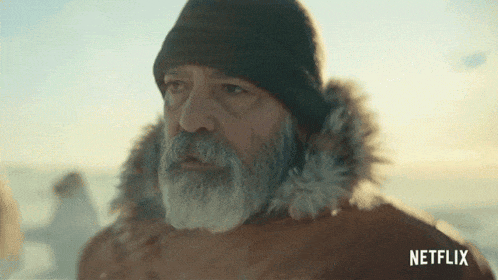The Midnight Sky
Image Credit: © 2020 NETFLIX
Simon Dillon,
13th Feb 2021
Tags:
Life
Review
Drama
Fantasy
Sci-Fi
Since I find myself back in lockdown, I will once again temporarily revert to a weekly film review from new (or new-ish) films released online. As a major vaccination campaign is now underway in the UK, I sincerely hope this will be the final phase of reviewing streaming rather than cinema releases.
Mark L Smith’s adaptation of a science fiction novel by Lily Dalton-Brooks.
With that minor sulk out of the way, here are my thoughts on Netflix’s The Midnight Sky, Mark L Smith’s adaptation of a science fiction novel by Lily Dalton-Brooks, directed by and starring George Clooney.
In the year 2049, an unspecified catastrophe has rendered Earth all but uninhabitable. The human race appears doomed. One man left on the surface is terminally ill astronomer Augustine (Clooney), who resides alone at an Arctic observatory. However, Augustine soon discovers he is not alone. A mysterious, mute little girl called Iris (Caoilinn Springall) apparently missed the earlier evacuation of the observatory, and has been left behind with him.
Augustine and Iris decide to make the dangerous journey to a different observatory.
Flashbacks reveal in earlier years, Augustine theorised the possibility of colonising one of Jupiter’s moons. A spaceship called the Aether was sent to see if such colonisation was possible, and is now returning. However, the crew are ignorant of the disaster on Earth, and cannot understand why they have lost contact. Aware of the Aether’s mission, Augustine and Iris decide to make the dangerous journey to a different observatory further north with a stronger transmitter, in order to warn the Aether not to return.

Performances are good, especially from Clooney, who hits just the right note of compelling melancholy gloom. He’s a man laden with regret, quietly determined to make some kind of amends in his final days. Springall is also terrific in her non-verbal performance, expressing much with facial features and bodily actions. A scene where she mischievously flicks peas at Clooney is a particular delight. Felicity Jones and David Oyelowo are also good, as members of the Aether crew, though their characters aren’t as well developed as I’d have liked.
I suspect many viewers will predict the twist in the tale.
The interspersing of Gravity style peril in space, and Revenant-ish trek through the Arctic wilderness is effective and compelling for the most part, albeit somewhat uneven. I suspect many viewers will predict the twist in the tale, but it still delivers a solid emotional punch. Visual effects are well done (especially a scene involving zero gravity blood droplets), and the drama is enhanced by a fine Alexandre Desplat score.

In some ways, the film feels like The Martian in reverse, with a dash of Silent Running and a pinch of Where Worlds Collide. Whilst the film does tap into contemporary environmental concerns, the lack of specificity about the catastrophe undermines the urgency in any inherent warning. The hints dropped seem to indicate accidental nuclear detonations, rather than global warming or the like, but this is never made clear.
The ending is actually far bleaker than it initially appears.
Also, without a clear explanation of what happened to the Earth’s population – there’s some reference to underground shelters that won’t last – the ending is actually far bleaker than it initially appears.
All that said, The Midnight Sky is a compelling watch for the most part, worth sticking with for Clooney and Springall’s performances in particular.








